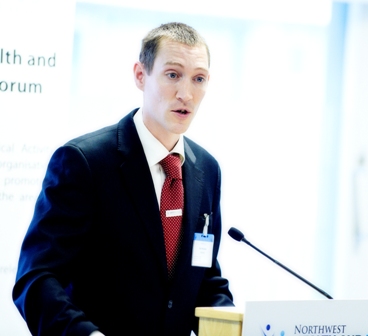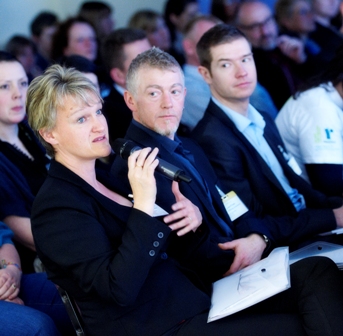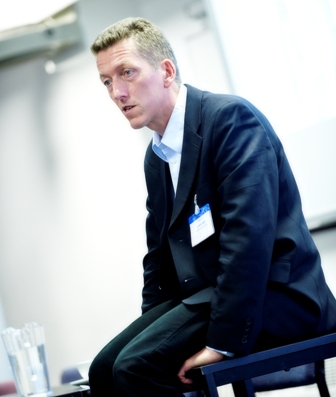 Rob Woollen
Rob Woollen
Legacy is not just about the Olympics
The aim of the North West Physical Activity Forum’s (NWPAF) conference this year was to take the bones out of the Olympic legacy from a health perspective. Chair Rob Woollen tells us what he learned.
 Rob Woollen
Rob Woollen
The theme of this year’s NWPFA annual conference was “Legacy = Long Term Impact: It’s Not Just About the Olympics”. The conference promised to explore legacy in depth, asking what it is, how to develop it and how to measure it.
The first keynote speaker, Mick Regan from Manchester City Council, explored the legacy left by the 2002 Commonwealth Games. Regan painted a bleak picture of Manchester at the time of the bid – both in terms of the area of East Manchester proposed for the stadium and in terms of how seriously the city was taken by the rest of the country. After describing how previous unsuccessful Olympic bids were turned from failures to the foundations of success, he went on to evaluate the lasting impact of the Games on the city. Despite concluding that there had been little impact on health outcomes in the region, Regan attributed a number of social and economic impacts to the 2002 Games. Looking beyond bland measures of morbidity and mortality, it is easy to see how these impacts could link to a more holistic view of health.
A session of small workshops with a more interactive and specialist focus followed the keynote, one of which was a discussion on the enduring legacy of yoga facilitated by Mick Timpson of Yogalife in Chorlton. As an architect and urban planner, Timpson had an interesting take on building wellness into communities. He drew a parallel between the Five Ways to Wellbeing developed by the New Economics Foundation in 2008 and five tenets of wellbeing developed thousands of years ago by yogis.
Back in the main room the second keynote speaker, Dr Kate Hughes from Liverpool John Moores University, offered an insight into her PhD research into the legacy of the 2012 Olympics. Dr Hughes gave a simple reminder about the need to consider the environment in which legacy may or may not be fostered using the equation C+M=O (Context + Mechanism = Outcome). Hughes warned against the potential for turning people off activity by holding up elite athletes as examples; the risk was making mere mortals feel unable to step up to the mark. She went on to make clear that legacy is something that should be in the plan from the very beginning warning that “it does not happen by osmosis”.
Back in the workshop format, Stewart Kellett of British Cycling then described the dual aims of his organisation: increasing participation among the population at large while continuing to win medals as a country at the top of the game. Kellett threw a strong challenge out to the Forum: how do we decrease the growing gap between gross domestic product (GDP) and population health? Certainly increasing activity would be a step in the right direction, although as pointed out by Jonathan Ives in a previous edition of The Leisure Review [Four Minutes to Fitness, TLR April 2013], this is more likely to come from short trips to the shop than from organised rides. British Cycling has some impressive statistics about the long-term impact of their Sky Ride programme which is very likely to lead to a sustained increase in activity among those who are introduced or reintroduced to cycling. Key to this is the use of a media partner who has a huge reach in the UK.
The afternoon’s keynote speakers were Professor Lindsey Dugdill of Salford University and Dr Nick Cavill of Cavill Associates. Professor Dugdill reported on an evaluation of the free swimming initiative in Wigan. With the government pulling the funding plug on the programme part way through, the data had limitations but, looking at cost-effectiveness in terms of quality-adjusted life years (QALYs), free swimming did not appear to meet the requirements set out by NICE for interventions. However, Dugdill showed that in terms of an economic cost-benefit analysis, the return from investment in free swimming was worthy of note. The plenary discussion which followed Dugdill’s presentation called for a more concerted approach to the measurement of leisure facility usage, which seems both achievable and sensible given both the amount of duplication that currently exists and the potential for better decision-making that would arise.
Dr Cavill then presented a timeline of health promotion (into health improvement) from the nineties to the present day. It was intriguing to see the huge impact that was made on activity levels – not by national governing bodies of sport or by Sport England – but by the congestion charge in London and by cycling demonstration towns. Cavill pointed out that when it comes to increasing incidental activity such as cycle commuting and walking we may well be looking in the wrong place. Transport authorities may be doing what they do for different reasons but they are shown to be highly effective at developing physical activity. Cavill also drew a contrast between self-reported activity levels and those that are directly measured, adding weight to Professor Dugdill’s call for a unified approach to measurement.
After a final workshop session, in which John Smith of Mersey Travel provided further evidence to support Dr Cavill’s argument, Professor Dugdill, Nick Colledge (head of health and wellbeing at Wigan Leisure and Culture Trust) and Maggie Moody (portfolio manager for Target Wellbeing) took part in a panel discussion drawing together thoughts from the day the main thrust of which was that legacy is far more than the simple health statistics show. With proper planning, appropriate partnerships and a holistic view of the impact of our programmes we can all strive to deliver and demonstrate lasting impact.
Rob Woollen is chair of the North West Health and Physical Activity Forum. He shares his time between the running of Manchester personal training company RWPT, and his employee wellbeing consultancy, providing services to a range of public and private sector organisations.
The full programme can be viewed at ww.eventsnorthern.co.uk/downloads/
The NWHPAF is a voluntary group dedicated to sharing good practice in the field. In addition to our popular annual conference, we hold a number of members’ networking and learning events throughout the year. As well as welcoming new members, we are currently recruiting to our steering group. Find out more about how to join the Forum on www.activehealthforum.org.uk
The Leisure Review, May 2013
© Copyright of all material on this site is retained by The Leisure Review or the individual contributors where stated. Contact The Leisure Review for details.
![]() Download a pdf version of this article for printing
Download a pdf version of this article for printing

